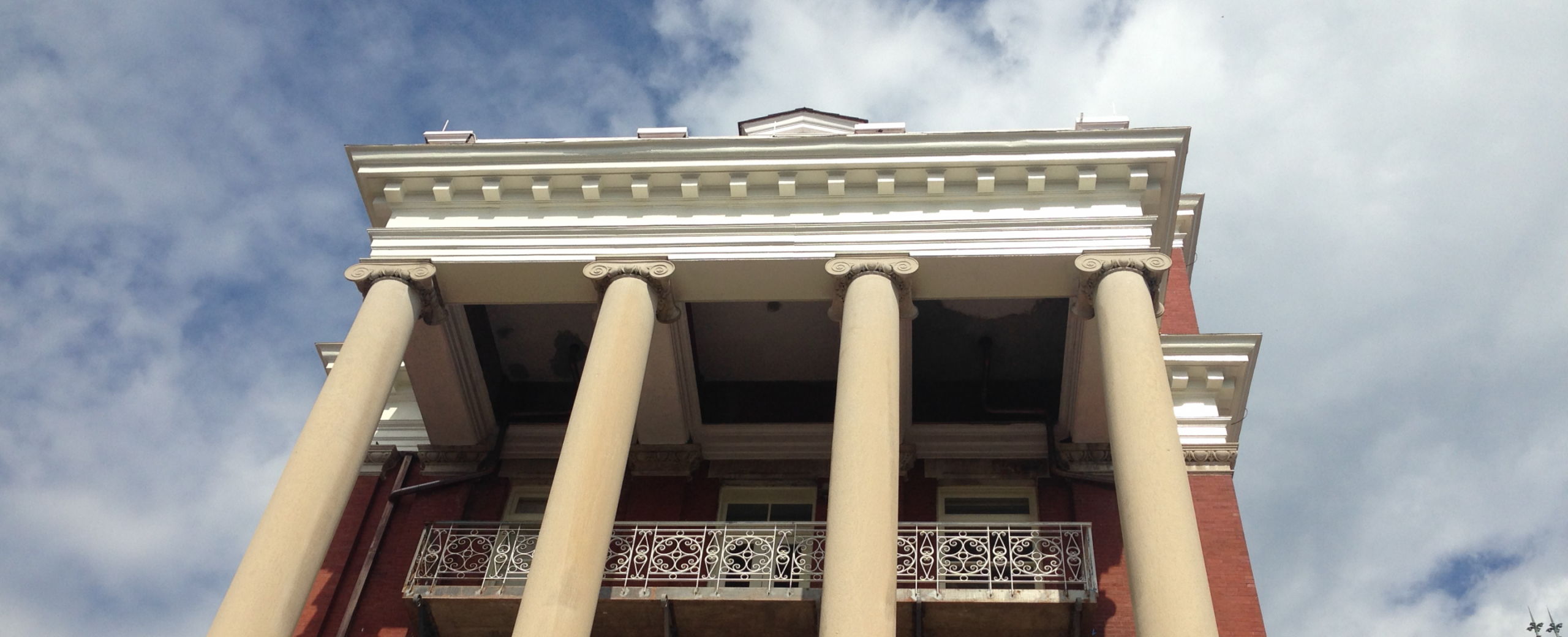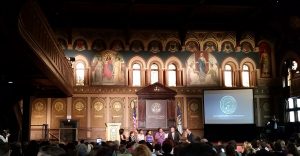In the three weeks since Georgetown University President John DeGioia released the proposals of Georgetown’s Working Group on Slavery, Memory, and Reconciliation, activists and descendants of the men and women who were sold 178 years ago by Jesuits have had the chance to re ect on Georgetown’s response to its troubled past. Their verdict? This is only the beginning.
Sandra Green Thomas, who lives in and works for the city of New Orleans and is a lead organizer in the descendant community, welcomed the proposals as the first step in the University’s efforts to bring descendants back into the Georgetown community.
“I think it has the potential to be successful,” said Thomas. “I can’t judge for everyone and anyone whether it is sufficient, but I think it has the potential to be successful.”
The working group was convened just over a year ago by President DeGioia to address Georgetown’s historical ties to slavery, including the potential renaming of “Mulledy” and “McSherry” Halls — named for Georgetown Jesuits who oversaw the 1838 sale of 272 slaves to Louisiana plantations in order to pay off some of the school’s debts. In November 2015, after the group’s first two months, slow-moving deliberations and lack of transparency sparked student sit-ins and protests. On Sept. 1, 2016, the report of the working group included an official apology from the University for its role in slavery, an offer of legacy status for descendants applying to Georgetown, the renaming of the two halls, and the establishment of an institute for the study of slavery as well as a living memorial in remembrance of the University’s enslaved people on campus, sometimes referred to as the “GU272.”
According to Stacy Kerr, assistant vice president of communications at Georgetown, these past weeks since the announcement have seen the University begin to engage with the descendants and the Georgetown community as to how best implement the proposals in the working group’s report, as well as discuss their feedback.
Richard Cellini (COL ’84, LAW ’88), described his reaction to the proposals as optimism tinged with disappointment. Cellini, the founder of the Georgetown Memory Project (GMP) which has traced over 2,500 descendants of 209 out of the 272 slaves since its beginning just one year ago, cited the lack of involvement of the descendants in the working group as one of the main shortcomings of the process. Despite the GMP’s report to the University back in December 2015 that descendants of the GU272 had been found, the working group did not include them in its deliberations, nor were the descendants given advance notice of the report’s contents this September.
While Thomas would have preferred to see descendants incorporated into the working group’s process, she explained that it is up to Georgetown as an institution to decide how it would approach its history.
“I think Georgetown University is determining in and of itself what Georgetown wants to do,” she said. “Ultimately, they handled it in the manner that they saw fit.”
One of the most prominent proposals to come from the working group was the preferred admission status—similar to the legacy status given to applicants whose family members are alumni—that will be given to descendants who apply to the school. Cellini notes that this is a fine gesture, but does not reach the heart of the problems some descendants face today: unequal educational and economic opportunities before they even get to Georgetown.
“Georgetown is offering dessert to some people who haven’t had any supper,” said Cellini. “Legacy admission is sort of the cherry on top of a long, successful educational career for somebody who will require much more substantial assistance in achieving admission to Georgetown. The right place to start is not legacy admission status; it’s prenatal health care.”
While the University’s appeal to descendants to apply to Georgetown is clear, some people also find it limiting. Karran Harper Royal, an activist for improved public education in New Orleans and one of the lead organizers within the descendant group, concurs with Cellini’s call to expand the preferred admission status to a broader range of assistance. She emphasized the importance of providing greater educational opportunities to those who have inherited a playing field unleveled 178 years ago.
“If wealth can be carried forward, certainly the generational trauma and strife can be carried forward,” said Harper Royal. “Education is the great equalizer, and there’s no price you could put on our ancestors for what they lost and what has been lost generation to generation.”
Harper Royal said that Georgetown was on the right track, but the nature of legacy admissions did not fully address descendants’ needs. She mentioned that Georgetown will not be the right educational fit for her own son, but says she would still like to see the University aid her son in achieving his ambitions as needed.
“We just need to create a process to make sure whatever the educational aspirations are for the descendants, that they can be met,” said Harper Royal. “But legacy is good; we’ll take that and then some.”
Descendants have begun that process through the creation of a charitable foundation in which they hope Georgetown and the Jesuits will partner. The ultimate goal is to endow the foundation with at least one billion dollars. Thomas explained that the foundation is not to collect reparations for her ancestors’ labor, but rather to uplift and educate the community as a whole, both inside and outside Georgetown, about the history of slavery and the effect it has left on the nation. She has openly invited Georgetown to take their relationship further, but said it is up to the University to accept it.
Cellini also urged Georgetown and the Maryland Jesuits to accept that invitation and provide the bedrock for the foundation with descendants in the lead.
From there, other organizations–Jesuit high schools and colleges, nancial institutions, and those who have benefited from the history of slavery–will be welcomed to aid the foundation further.
“It’s a way to turn a very, very bad chapter into a very, very good chapter,” said Cellini. “They are asking for charitable investments in a shared future. It’s a little surprising that it’s the descendants and not the Jesuits who are advancing this proposal.”
While Thomas, Cellini, and Harper Royal are still looking for ways to expand upon what Georgetown has already offered, they also emphasize the value of the University’s taking these steps in the rst place.
In the months since the formation of the working group, Georgetown has been in the national spotlight and at the forefront of trying to answer the question of how institutions that bene ted from slavery can face their past and move forward in the present.
Harper Royal hopes other institutions follow in Georgetown’s lead and begin examining how their pasts and presents have been influenced by the legacy of slavery. Thomas views Georgetown’s proposals as an opportunity to engage the nation in healing its ever-present racial tension. Cellini wants the Georgetown community, especially its students, to continue to engage in reflection and discussion. All look forward to a new stage in the partnership between Georgetown and the descendants of the men and women who built it from the ground up.
“We [at Georgetown] are all literally beneficiaries of the involuntary sacrifice of the GU272: we are not disinterested bystanders,” said Cellini. “I would encourage Georgetown undergraduates to look beyond themselves and try to imagine what it’s like to be 19 or 20 and be one of the descendants’ children and imagine what they would want for themselves. That’s what’s at stake here: our ability to lift our eyes off the Hilltop and look beyond the Potomac.”





